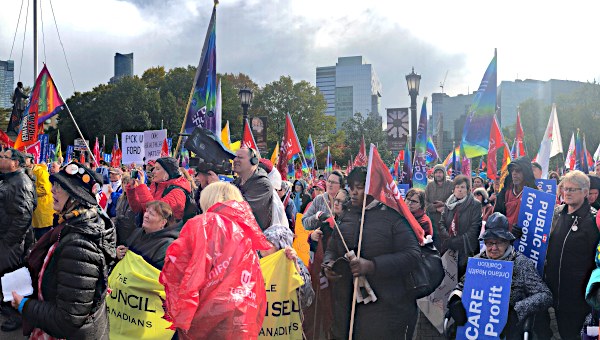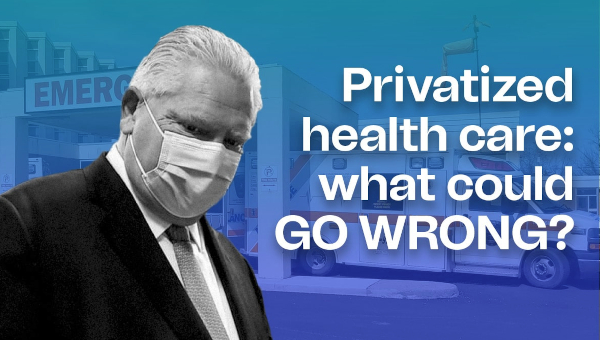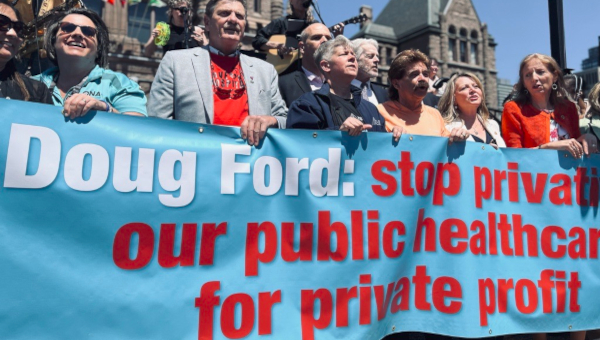Doug Ford’s New Long-Term-Care Legislation, Tolls for All of Us
Hope to live out your old age in dignity and comfort? Think again, after Ontario Premier Doug Ford’s “new” long-term-care legislation, Bill 37, was rushed through with furtive speed, just before the holidays. Ushering in a series of deadly amendments to the existing Long-Term Care Homes Act, this bill was submerged in the media tsunami around Omicron – but is, arguably, as deadly. There was a reason behind this haste. Many citizens may not know what we have lost, and Ford does not want us to know.
In 2020, Ontarians woke up to the devastating situation in our long-term-care (LTC) homes, which accounted for a horrifically disproportionate number of its COVID deaths. In the LTC facilities operating for profit, death rates were five times those of the publicly owned homes, and double those of the non-profits.
Claims that these differences are related not to for-profit ownership per se, but to the “conditions” in these homes (as if, somehow, conditions have nothing to do with profit), fail to acknowledge that decades of tax-funded incentives aimed at improving for-profit facilities were offered to their operators – and were declined.

Enough, Already
Studies – one after another after another – show that for-profit LTC is worse than that in publicly run facilities, across a range of outcomes. Owners siphon off revenues (from taxes and residents’ fees) to shareholders; spend 24 per cent less on direct care; have fewer staff and lower pay compared to non-profits; and fail to deliver on standards of care. So, yes, ownership matters. And ownership is the central issue of Bill 37.
Indeed, the bill represents Ford’s ongoing agenda, laid bare. It smooths the way for billions of public dollars to be funnelled to for-profit LTC for another entire generation. As previously written, the Long-Term Care Homes Act stated the government must be “committed to promotion of the delivery of long-term-care home services by not-for-profit organizations.”
Bill 37 changes this inconvenient phrase to allow Ford to promote for-profit ownership. The former act also expressly forbade the issuing of new licenses to operators with terrible records. In Bill 37, Ford attempts to remove this barrier as well.
But after the Ontario Health Coalition (OHC), representing over half a million patients, advocates and organizations, announced it would go to court to uphold the former act, Ford needed to hurry, because licenses covering over 30,000 LTC beds end in 2025. In November, Ford confirmed plans to allocate thousands of new beds in 30-year licenses to for-profit companies, including to operators of homes in which the military exposed hideous examples of neglect.
These expansions are paid for by public taxes, and by residents’ fees. Private profits and socialized harms: the agenda of Ford’s Ontario.
The Tolls of Bill 37
Now about Bill 37 itself, and first, about safety: before Ford, annual “surprise” quality inspections of LTC facilities were conducted, and regularly uncovered neglect. After Ford took power, only nine out of 626 homes in Ontario underwent these inspections, and not one home – not even those exposed for gross neglect – was fined or lost its license. Bill 37 does not change this.
Next, as anyone who has worked in LTC knows, without staffing there is no care. But Bill 37 does not increase staffing, instead proposing four years from now to implement four hours of daily care as a “target” – not a requirement, but an “average” across homes. It’s unenforceable within any individual home, and hence meaningless.
The OHC is supporting a challenge against Ford’s awarding of licenses to the for-profits chains, to ensure that the tragedy of over 4,000 vulnerable people – many of whom died alone, hungry, and lying in filth in for-profit LTC – never happens again.
Because Bill 37 tolls for the vulnerable – including you and me – in 10 years or 20, or tomorrow. •
This article first published on the Toronto Star website.





